lesson10_background information
现代大学英语精读5Book复件Lesson10BeforeandA

Preparation for critical thinking
03
Lesson 10 Content Analysis
Article structure
Summary: This lesson presents an article that compares the differences between "Before" and "After" scenarios, typically in terms of a transformation or progress.
Simple Sentences
Sentences that consist of a subject and predicate, expressing a complete thought. They are typically used to provide basic information or make declarations.
Organization: The article is typically divided into three main parts: the introduction, the body, and the conclusion. The introduction provides background information and a brief overview of the topic. The body presents theBeforeandAftercomparisons in detail, typically in separate paragraphs or sections. The conclusion summarizes the main points and highlights the significance of the comparison.
跟我学英语入门篇lesson10

跟我学英语入门篇lesson 10lesson 10 It is noon.(daytime) what time is it? It ismidnight.(nighttime)It is one o’clock.It is 1:00. Time words It is 1:15.(it is one fifteen) What time? It is a quarter past 1. What time is it? It is a quarter after 1. Itis_______.It is 9:30.(nine thirty) It is midnight. It is half past nine. It is noon.It is 12 o’clock. It is 11:45.(eleven fortyfive) It is ten to 5. It is a quarter to 12. It is 4:50.It is 10:10.(ten ten) It is 5 to 3. It is ten past 10. It is 2:55. It is ten after 10.It is 4 o’clock. It is 4:35.It is twenty-five to 5. It is 5 past 5.It is 5:05. It is 12:00.It is twelve o’clock. It is 12:25.It is 25 after 12. It’s 3:30.It’s half past three. It is 5 past 12.It is 12:05. It’s ten to 4.It’s 3:50.It is 3 o’clock. Read and repeatIt is ten to 2. It’s four o’clock.It is 1:50.It’s four fifteen. It is 5 o’clock. It’s 4:15.It is 20 to 4. It’s five thirty. It is 3:40. It’s half past five.Look and listen It’s five to five.It’s four fifty-fi ve. It’s 3 o’clock.It’s 3:00. What time?Prepositions of time It’s 3:15.It’s three fifteen. What time do you go to It’s a quarter past three. work?I go to work at 9:00 AM.get up He eats lunch at noon.go to bed The students start class atgo to the cinema nine fifteen.eat breakfasteat lunch Parts of the day.eat dinner in the morningstart work in the afternoonfinish work in the eveningat nightlook and listen we start class at 9:00 inI eat lunch at 1:00. the morning.She goes to bed at You study in themidnight. afternoon.We eat breakfast at 8:30. They go to the cinema inThey go to the cinema at the evening.7:15. He goes to bed at 11:00He goes to work at 8:00. at night.Read and repeat Look an listenWe get up at 6 o’cloc k. When do you eatThey eat dinner at half breakfast?past eight. I eat breakfast at 8:00 inShe finishes work at five the morning.thirty. When does ali eatbreakfast? She goes to the cinema at He eats breakfast at 7:30 7:00in the evening. in the morning. When do you finish When does Lisa eat work?lunch? We finish work at 6:00 in She eats lunch at noon. the evening.When do you go to the When do your parents go cinema? to bed?We go to the cinema at They go to bed at 8:00 in the evening. midnight.When do they go to bed?They go to bed at 11:00 everyat night. every morningearlyRead and repeat lateWhen do you go to work?I go to work at 8:30 in the I get up at 7:00 every morning. evening.When does Dan eat She goes to bed at 11:30 lunch? every night.He eats lunch at 1:30 in He watches the clock the afternoon. every hour.When does Julia go to the He gets up early. He gets cinema? up at 5:00 AM.They go to bed late. They o’clock in the evening. go to bed at 2:00 AM. We study English every We are early. morning.We are late. The class starts at 9o’clock.Look and listen Now it is 9:30. He usually starts work at Isabelle isn’t here.9 o’clock. Isabelle is late. We usually finish work athalf past five. Time wordsWhen?We are here at half past When do you go to bed? six. What time do you go to We are late. bed?Lisa and isabelle don’t go (the same meaning) to the cinema every evening. Look and listenWhen do you eat lunch? Read and repeat I eat lunch at noon. We eat breakfast at halfpast seven every morning. When does Ali usually eat Ali usually gets up at half dinner?past 6 in the morning. He usually eats dinner at Lisa starts work at 7 6 o’clock in the evening.What time does Lisa start latework? Lisa usually eats breakfast She stars work at 7 at half past eight in the o’clock in the evening. morning.Ali sometimes eats lunch Read and repeat at one o’clock in the When does Julia go to the afternoon.cinema? Isabelle never goes to the She goes to the cinema at cinemain the morning. nine fifteen. The teacher often starts What time doesshe finish work early.work? The singer usually works She finishes work at half late.past four. Read and answer When does she finish Luke is molly’s son.work? He gets up every morning She finishes work at half at halfpast six. past four. He doesn’t eat breakfast. Review He usually starts work at Listen and write eight o’clock in theevening morning.breakfast Sometimes he eats lunch o’clock at noon.early Sometimes he eats lunchat 1:00 in the afternoon. lunch at noon. He finishes work at five Sometimes he eats thirty. He often eats dinner lunch at 1:00. at Burger King or 6. What time does he McDonald’s. He likes finish work? hamburgers. He finishes work at In the evening he watches five thirty. television and he goes to 7. Where does he eat bed at 11 o’clock. dinner?1. whose son is Luke? He eats dinner atLuke is molly’s son. Burger King or 2. What time does he get McDonald’s.up? 8. Does he likeHe gets up at half past hamburgers?six. Yes, he does. 3. Does he eat breakfast? 9. When does he watch No, he doesn’t. television? 4. When does he start He watches televisionwork? in the evening.He starts work at 8 10. What time does he goo’clock in the morning. to bed?5. When does he eat He goes to bed at 11lunch? o’clock.Sometimes he eats。
Lesson10
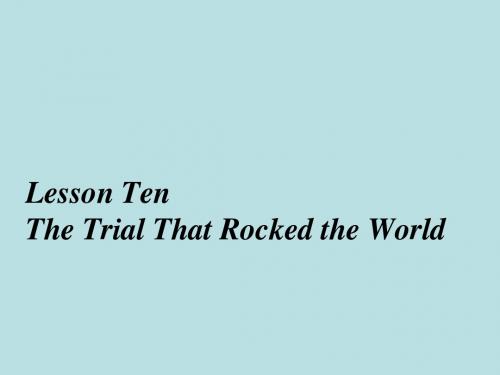
II. Background information
• The ACLU placed an ad inviting a teacher to help test the law in the courts. Dayton was in an economic slump, and the town's movers and shakers thought a sensational trial would put Dayton "on the map”. • John Scopes was playing tennis when a group of businessmen called him to the town gathering place, Robinson's drugstore. They asked if he would be willing to be indicted for teaching evolution. Though he could not remember actually teaching Darwin's theory, Scopes believed in evolution and agreed to the plan.
II. Background information
• 2. Background Information about the “monkey trial” • John Scopes came to Tennessee fresh out of college. In the spring of 1925, he had just completed his first year as science teacher and part-time football coach at the high school in the little town of Dayton. • Scopes planned to return home to Kentucky for the summer. But in his words, "a beautiful blonde" distracted him and he stayed for another week hoping for a date. The decision changed his life forever. • It all began when the state of Tennessee passed a law making it a crime to teach evolution in public schools. A new organization called the American Civil Liberties Union responded immediately.
教案Lesson-10--Mandela’s-Garden
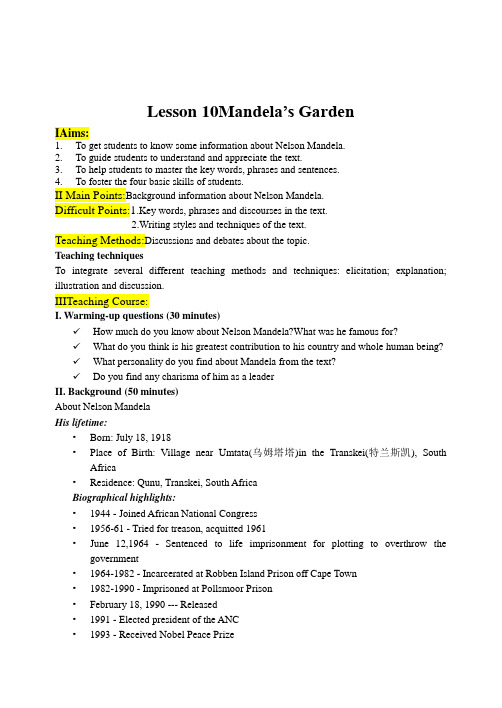
Lesson 10Mandela’s GardenIAims:1.To get students to know some information about Nelson Mandela.2.To guide students to understand and appreciate the text.3.To help students to master the key words, phrases and sentences.4.To foster the four basic skills of students.II Main Points:Background information about Nelson Mandela.Difficult Points:1.Key words, phrases and discourses in the text.2.Writing styles and techniques of the text.Teaching Methods:Discussions and debates about the topic.Teaching techniquesTo integrate several different teaching methods and techniques: elicitation; explanation; illustration and discussion.IIITeaching Course:I. Warming-up questions (30 minutes)✓How much do you know about Nelson Mandela?What was he famous for?✓What do you think is his greatest contribution to his country and whole human being?✓What personality do you find about Mandela from the text?✓Do you find any charisma of him as a leaderII. Background (50 minutes)About Nelson MandelaHis lifetime:•Born: July 18, 1918•Place of Birth: Village near Umtata(乌姆塔塔)in the Transkei(特兰斯凯), South Africa•Residence: Qunu, Transkei, South AfricaBiographical highlights:•1944 - Joined African National Congress•1956-61 - Tried for treason, acquitted 1961•June 12,1964 - Sentenced to life imprisonment for plotting to overthrow the government•1964-1982 - Incarcerated at Robben Island Prison off Cape Town•1982-1990 - Imprisoned at Pollsmoor Prison•February 18, 1990 --- Released•1991 - Elected president of the ANC•1993 - Received Nobel Peace Prize•1994 -1999 ---- President of South AfricaNelson Mandela, a legendary figure, is one of the greatest moral and political leaders of our time: an international hero whose lifelong dedication to the fight against racial oppression in South Africa won him the Nobel Peace Prize and the presidency of his country. Since his triumphant release in 1990 from more than a quarter-century of imprisonment, Mandela has been at the center of the political drama in the world. As president of the African National Congress and head of South Africa's antiapartheid movement, he was moving the nation toward multiracial government and majority rule. He is respected everywhere as a vital force in the fight for human rights and racial equality.Long Walk to Freedom is his moving and autobiography, a book destined to take its place among the finest memoirs of history's greatest figures. Here for the first time, Nelson Mandela tells the extraordinary story of his life - an epic of struggle, setback, renewed hope, and ultimate triumph, which has, until now, been virtually unknown to most of the world.The text is adapted from Long Walk to Freedom, the autobiography of Nelson Mandela published in USA,in 1994.In thisbook,for the first time, Nelson Mandela tells the extraordinary story of his life - an epic of struggle, setback, renewed hope, and ultimate triumph, which has, until now, been virtually unknown to most of the world.III. Detailed analysis (100 minutes)A. structure of the text (30 minutes)Part 1: Description of his gardening experience(para. 1- 8)The gardening gives him satisfaction, offers a taste of freedom, and makes him strong physically and mentally.Part 2: Significance of his gardening experience(para.9 - the end)It has become a metaphor and gives him inspiration on how to be a good revolutionary leader and how to nourish important human relationship.B. Language understanding (70 minutes)1. liberating/liberatedI felt liberated from the manual work. Exx:I found Dickens’s novel very interesting. I was ____.The news was very disappointing. I felt terribly ______.The result is a bit surprising. Everybody was ______.The whole experience was exciting. We all got ______.2.survive➢vi. to remain alive or in existence:----Few survived after the flood.----Books have survived from the time of the Egyptians.➢vt. to live longer than; outlive:----He survived his wife for many years.➢to live or persist through----The house survived the storm.More expressions:the survival of the fittest, hopes of survivalthe only survivor of the shipwrecksend help to the survivors of the earthquake3. …one must develop ways to take satisfaction in one’s daily life.take satisfaction in (doing) sth.to learn to enjoy (doing)sth.More phrases:find satisfaction infeel satisfaction atto sb.'s satisfaction (to the satisfaction of sb.)4.…that I was a miner at heart1.He has to learnall the words_by _heart.2.He is an enthusiastic reformer __at _heart.3.The words were spoken __from_ _the depths of her heart.4.He has lost his heart _to__ a very pretty young girl.5. contactn&vFriendly contacts between different peoples facilitate the cultural and economic interchange.She comes into contact with many people.a contact in ParisI shall contact you by telephone on Friday.be in [out of] contact with, lose contact withcontact lenses, contact officer6. decline v. n.to slope or move downwardsThey wish that prices would decline.to move from a better to a worse position, or from higher to lowerHis power/health/influence has begun to decline now that he is old.to refuse, (usu. Politely); be unwillingWe asked them to come to our party, but they declined (the invitation).the decline of the Roman Empirethe decline of lifeautumn declinecf.decline, to refuse politely, formal wordHe declined the nomination.refuse, to say or show one is unwilling to give or accept sth. general word.He refused to take the money.reject, to refuse to accept, believe, strong wordThey rejected damaged goods.7. pursueThe police are pursuing an escaped prisoner.She pursued the study of English for five years.He pursued the river to its source.We have always pursued a friendly policy towards the people all over the world.scholastic pursuitin one's pursuit of happiness8. fulfillThey fulfilled their work ahead of time.If he's lazy, he'll never fulfill his ambition to achieve anything.She succeeded in fulfil(l)ing herself as an actress.fulfil(l) one's dutyfulfil(l) one's promisea sense of fulfillment9. flourishPlants flourish in this earth.He is flourishing in his new job.The British Empire flourished in the 19th century.He flourishes his wealth.They showed us about the house with much flourish.in full flourishflourish like the green bay-tree (from the Bible)10. endureThey had spent three days in the desert without water, and could not endure much longer.Few of the runners endured to the finish.She endures many discomforts without complaint.I can't endure loud music.His fame will endure for ever.Cheap cloth has little endurance.Long distance runners need great endurance.His cruelty is beyond endurance.11. eliminateShe went through the typescript carefully to eliminate all errors from it.We eliminate most of the runners in the heats; only the best run in the final.The platform bridge over the railroad tracks eliminated danger in crossing.He was distressed at the elimination from the contest.12. nourishMilk nourishes a baby.nourish hope i n one’s heartsit up and take nourishment13. witherOlder people are complaining that the old ethical values are withering away.The flowers withered in the cold.She withered him with a look.14. tendertender meat a tender mothera person of tender age [years]My finger is tender because I cut it yesterday.She has a tenderness for cats.IV.Assignment: Exercises after the text.V.Checking the exercises.VI. Dictation of the new words in the lesson.。
高考英语3500词高频900词Lesson 1-10
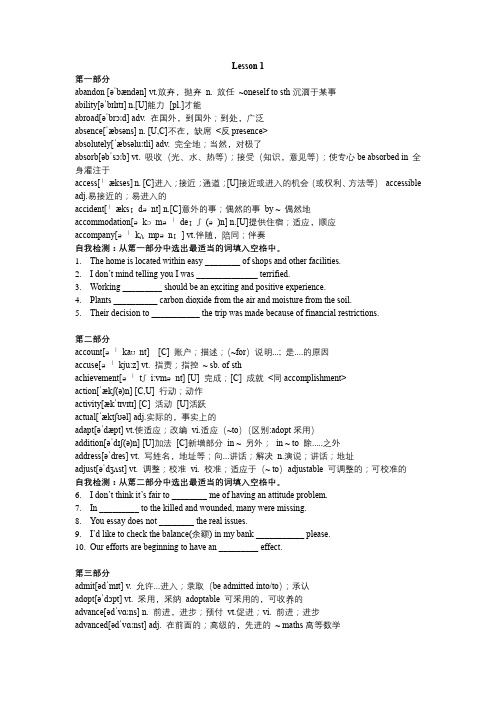
Lesson 1第一部分abandon [əˈbændən] vt.放弃,抛弃n. 放任~oneself to sth沉湎于某事ability[əˈbɪlɪtɪ] n.[U]能力[pl.]才能abroad[əˈbrɔːd] adv. 在国外,到国外;到处,广泛absence[ˈæbsəns] n. [U,C]不在,缺席<反presence>absolutely[ˈæbsəluːtli] adv. 完全地;当然,对极了absorb[əbˈsɔːb] vt. 吸收(光、水、热等);接受(知识,意见等);使专心be absorbed in 全身灌注于access[ˈækses] n. [C]进入;接近;通道;[U]接近或进入的机会(或权利、方法等)accessible adj.易接近的;易进入的accident[ˈæksɪdənt] n.[C]意外的事;偶然的事by ~ 偶然地accommodation[əkɔməˈdeɪʃ(ə)n] n.[U]提供住宿;适应,顺应accompany[əˈkʌmpənɪ] vt.伴随,陪同;伴奏自我检测:从第一部分中选出最适当的词填入空格中。
1.The home is located within easy ________ of shops and other facilities.2.I don’t mind telling you I was ______________ terrified.3.Working _________ should be an exciting and positive experience.4.Plants __________ carbon dioxide from the air and moisture from the soil.5.Their decision to ___________ the trip was made because of financial restrictions.第二部分account[əˈkaʊnt] [C] 账户;描述;(~for)说明...; 是....的原因accuse[əˈkju:z] vt. 指责;指控~ sb. of sthachievement[əˈtʃi:vmənt] [U] 完成;[C] 成就<同accomplishment>action[ˈækʃ(ə)n] [C,U] 行动;动作activity[ækˈtɪvɪtɪ] [C] 活动[U]活跃actual[ˈæktʃʊəl] adj.实际的,事实上的adapt[əˈdæpt] vt.使适应;改编vi.适应(~to)(区别:adopt采用)addition[əˈdɪʃ(ə)n] [U]加法[C]新增部分in ~ 另外;in ~ to 除.....之外address[əˈdres] vt. 写姓名,地址等;向...讲话;解决n.演说;讲话;地址adjust[əˈdʒʌst] vt. 调整;校准vi. 校准;适应于(~ to)adjustable 可调整的;可校准的自我检测:从第二部分中选出最适当的词填入空格中。
研究生英语阅读教程(提高级-第三版)-教学课件Lesson-10
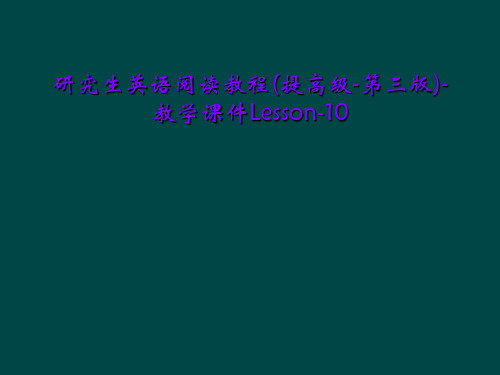
Background Information
and used logic and reasoning to support his points. By the Way, BTW: “St.” in this context means “Saint”, a holy and virtuous person. It sometimes is used in lower case, saint, to a Christian believer. – Not to be confused in other contexts with “Street,” as in Broadway St., Broadway Street.
14
Background Information
Sir Isaac Newton (1642-1727)
English physicist, mathematician, and natural philosopher, considered one of the most important scientists of all time. He formulated laws of universal gravitation and motion— laws that explain how objects move on Earth as well as through the heavens.
12
Background Information
Empedocles (490 BC?-430 BC) Greek philosopher, statesman, and poet.
13
Background Information
Karl Popper ( 1902-1994 ) Austrian-born British philosopher of science, known for his theory of scientific method and criticism of historical determinism.
2019-2020年七年级英语Module10 Section 1 Background Readings教案 外研社

2019-2020年七年级英语Module10 Section 1 Background Readings教案外研社1. Forming a WH- questionWH- questions (using words such as "what", "when", "where" etc.) are also created by putting the auxiliary do before the subject. Then, you add the WH- word at the beginning. Here are some examples:I sing Do I sing?What do I sing?You speak.Do you speak?Why do you speak?He lives Does he live?Where does he live?2. What is a puter?A puter is a device or machine for processing information from data according to a program —a piled list of instructions. The information to be processed may represent numbers, text, pictures, or sound, amongst many other types.puters are extremely versatile. In fact, they are universal information processing machines. According to the Church-Turing thesis, a puter with a certain minimum threshold capability (in technical terms, one way to describe this is that the machine must have the ability to emulate a universal Turing machine) is in principle capable of performing the tasks of any other puter, from those of a personal digital assistant to a superputer. Therefore, the same puter designs have been adapted for tasks from processing pany payrolls to controlling industrial robots. Modern electronic puters also have enormous speed and capacity for information processing pared to earlier designs, and they have bee exponentially more powerful over the years. This process was dubbed Moore's Law.puters are present in a variety of physical packages. The original puters were the size of a large room, and such enormous puting facilities still exist for specialised scientific putation - superputers - and for the transaction processing requirements of large panies, generally called mainframes. Smaller puters for individual use, called personal puters, and their portable equivalent the notebook puter, are ubiquitous information processing and munication tools and are perhaps what most non-experts think of as "a puter". However, the most mon form of puter in use today is the embedded puter, a (usually) small puter used to control another device. Machines from fighter planes to digital cameras are controlled by embedded puters.3. The InternetThe Internet, or simply the Net, is the publicly accessible worldwide system of interconnected puter networks that transmit data by packet switching using a standardized Internet Protocol (IP) and many other protocols. It is made up of thousands of smaller mercial, academic, domestic and government networks. It carries various information and services, such as electronic mail, online chat, and the interlinked web pages and other documents of the WorldWide Web.2019-2020年七年级英语Module10 Section 2 Words and Expressions教案外研社1. putern.计算机;电脑an automatic electronic machine for performing calculations: This afternoon an old scientist will give us a talk on the puter. 今天下午一位老科学家将给我们作关于计算机的报告。
研究生英语阅读教程基础级-第三版 教学课件Lesson 10
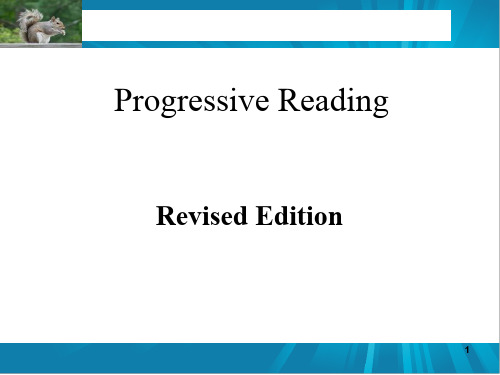
6
BackgTrroaunnsdlaItniofonrmation
linity(男子气)and became an enduring American icon. He was famous for his distinctive voice, walk and height. He was also known for his conservative political views.
8
Wildlife control
In Toronto( 多伦多), due to the rapid growth of population, many untouched wildlife habitats(栖息地) have been settled or invaded. Consequently some wild animals have emigrated to further remote places while others have found ways to adapt to populated zones. Therefore, conflicts between human and wildlife occur regularly. Services which aim at resolving the conflicts by usually removing wild animals from people’s houses found their market.
11
Squirrel
A small animal with a long furry tail that climbs trees and eats nuts.
Lesson 10. The discovery of what it means to be an American(课堂PPT)
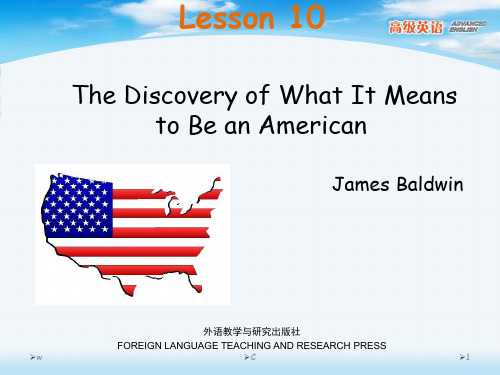
Black people
American
➢
➢Company Logo
➢3
Ⅲ. Discussion
1) How do you think the United States differs from Europe?
2) Why do American writers like to go to Europe? 3) In what ways do you think a writer differs from the
➢
➢Company Logo
➢8
Ⅰ. About the Author
• He is a major spokesman for his race in the Civil Rights Movement of the 1960s. In protest against the racial discrimination he left the US at 24 to live in France, where most of his work was written. “At the root of the American Negro problem is the necessity of the American white man to find a way of living with the Negro in order to be able to live with himself.”
➢Company Logo
➢Company Logo
➢12
Ⅳ. Les Miserables悲惨世界
➢
An 1862 French novel by author Victor Hugo and is widely considered one of the greatest novels of 19th century. It follows the lives and interactions of several French characters over a seventeen-year period in the early 19th century, starting in 1815 and culminating in the 1832 June Rebellion. The novel focuses on the struggles of ex-convict Jean Valjean and his experience of redemption. It examines the nature of law and grace, and expatiates upon the history of France, architecture of Paris, politics, moral philosophy, antimonarchism, justice, religion, and the types and nature of romantic and familial love.
大学体验英语视听说教程4第三单元课后答案

1. enormously 2. ally 3. mystify
4. tier 5. corporate 6. critical
A. to make people confused because they do not understand sth.
B. extremely important C. very; very much D. connected with a corporation E. a person who helps and supports sb. who is in a
Lead-in Audio studio Video studio Speaking workshop Project bulletin
Task 1 Task 2 Task 3
Task 1 Describing the Picture
Describe the picture first and then discuss why Pizza Hut is successful in China.
difficult situation F. one of several levels in an organization or a system
Audio Studio
1. embassy 大使馆 2. peer身份(或地位)相同 的人
Task 1 Task 2
Audio Task 1 Identifying the Gist
3. Did Mr. Goodman accumulate enough experience of doing business before he came to China?
Answer: No, never. He started his business of a chain of cafes while he studied in BLCU.
Background lesson 10

The Map of Lebanon
Lebanon
The Republic of Lebanon or Lebanon is small ,largely mountainous country situated at the eastern edge of the Mediterranean Sea , in an area referred to as the Middle East (or Southwest Asia ). It is bordered by Syria on the east and north ,and Israel on the south ,with a narrow coastline on its west. The name Lebanon derives from the Semitic languages word Laban , meaning the “ white ” peaks of the Lebanon Mountains . Its flag features the Lebanon Cedar. An Arabic cognate of the word laban also means “ yogurt ” .
Author— Author— Works
Anwar is a published writer whose work has appeared in books, literary anthologies, reviews, and college textbooks in the USA and abroad Bibliography(书目) Bibliography(书目) Short Fiction “ The Camera" in Homeworks (1996) Non-Fiction( Non-Fiction(纪实类文学作品 ) The Boy from the Tower of the Moon (1999) (Luminous memoir from a Lebanese village boy)
现代大学英语 第五册 Lesson 3 教案
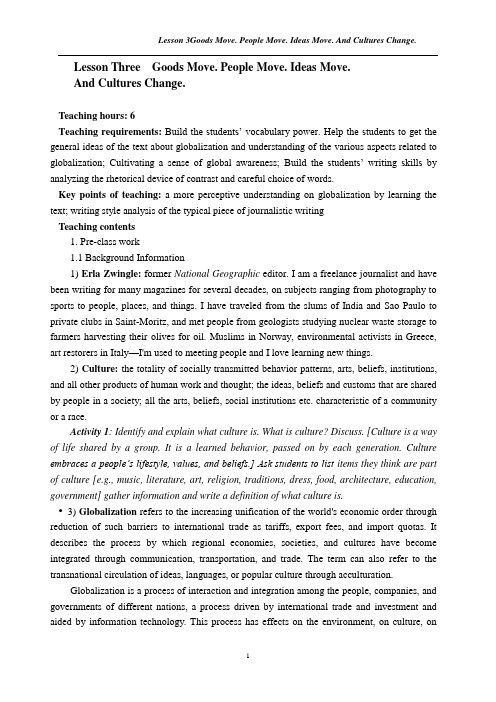
Lesson Three Goods Move. People Move. Ideas Move.And Cultures Change.Teaching hours: 6Teaching requirements: Build the students’ vocabulary power. Help the students to get the general ideas of the text about globalization and understanding of the various aspects related to globalization; Cultivating a sense of global awareness; Build the students’ writing skills by analyzing the rhetorical device of contrast and careful choice of words.Key points of teaching: a more perceptive understanding on globalization by learning the text; writing style analysis of the typical piece of journalistic writingTeaching contents1. Pre-class work1.1 Background Information1) Erla Zwingle: former National Geographic editor. I am a freelance journalist and have been writing for many magazines for several decades, on subjects ranging from photography to sports to people, places, and things. I have traveled from the slums of India and Sao Paulo to private clubs in Saint-Moritz, and met people from geologists studying nuclear waste storage to farmers harvesting their olives for oil. Muslims in Norway, environmental activists in Greece, art restorers in Italy—I'm used to meeting people and I love learning new things.2) Culture: the totality of socially transmitted behavior patterns, arts, beliefs, institutions, and all other products of human work and thought; the ideas, beliefs and customs that are shared by people in a society; all the arts, beliefs, social institutions etc. characteristic of a community or a race.Activity 1: Identify and explain what culture is. What is culture? Discuss. [Culture is a way of life shared by a group. It is a learned behavior, passed on by each generation. Culture embraces a people’s lifestyle, values, and beliefs.] Ask students to list items they think are part of culture [e.g., music, literature, art, religion, traditions, dress, food, architecture, education, government] gather information and write a definition of what culture is.•3) Globalization refers to the increasing unification of the world's economic order through reduction of such barriers to international trade as tariffs, export fees, and import quotas. It describes the process by which regional economies, societies, and cultures have become integrated through communication, transportation, and trade. The term can also refer to the transnational circulation of ideas, languages, or popular culture through acculturation.Globalization is a process of interaction and integration among the people, companies, and governments of different nations, a process driven by international trade and investment and aided by information technology. This process has effects on the environment, on culture, onpolitical systems, on economic development and prosperity, and on human physical well-being in societies around the world. Globalization is deeply controversial, however. Proponents of globalization argue that it allows poor countries and their citizens to develop economically and raise their standards of living, while opponents of globalization claim that the creation of an unfettered international free market has benefited multinational corporations in the Western world at the expense of local enterprises, local cultures, and common people. Resistance to globalization has therefore taken shape both at a popular and at a governmental level as people and governments try to manage the flow of capital, labor, goods, and ideas that constitute the current wave of globalization.Activity 2:Examine and analyze how technology influences the spatial processes of cultural convergence and divergence. Have students examine and analyze how communications and transportation technologies contribute to cultural convergence (i.e., how electronic media, computers, and jet aircraft connect distant places in a close network of contact through cross-cultural adaptation). How do they see themselves in this convergence? Students should draw a map and write an essay reflecting their findings. They should address the question: How does the role of technology affect the ways in which culture influences spread and influence the way people live?1.2 Questions for discussionWhat’s the author’s attitude towards globalization?Do you think globalization equals to Americanization?What’s your reaction to th e changed culture? Are you ready for this challenge?1.3 Synonyms for globalization: mixing, merging, fusion, blending2. Detailed study of the text2.1 Reading for the main ideaGlobalization is an inevitable historical process. There will be a diversity of cultures coexisting in the world, and these cultures are brought together not only by technology or business but more importantly by common aspiration and shared values. (Globalization will not lead to Americanization but a coexistence of transformed culture made possible by common aspiration and shared values of human beings.)2.2 Language pointssmallish: fairly smallseedy: shabby, rundownthrift shop: a shop that sells used articles, especially clothing, as to benefit a charitable organizationcatch on: become popular and fashionableoriginal: not derived from something else; fresh and unusual; newcome up with: think of an idea, plan or reply; producepunk: a type of loud violent music popular in the late 1970s and 1980smorph: turn into variants form without changing the essencegeek: performer of grotesque or depraved actschunky: short and thicktile: a marked playing piece, as in mahjong2.3 Text analysis⏹This is a piece of argumentation. The author approaches the issue of “globalization”from a historical perspective instead of a political or economic one.⏹Effective writing skill: the rhetorical device of contrastPart I (paras.1—3) the beginningGlobalization is a reality but it is not something completely new. What is new is the speed and scope of changes.Part II (paras.4—6) different views on globalizationPart III (paras.7—9) three points in this part: Westernization is not a straight road to hell, or to paradise either; Cultures are as resourceful, resilient, and unpredictable as the people who compose them; Teenagers are one of the powerful engines of merging global cultures.Part IV (paras.10—13) the author’s experience with Amanda Freeman, a cool hunterPart V (paras.14—19) in order to prove that fusion is the trend, the author used Tom Sloper and Mah-jongg as an example.Part VI (para.20) we should notice something in China.Part VII (paras.21—24) the cultural trends in ShanghaiPart VIII (paras.25—28) the author used the experience at Shanghai Theatre Academy to illustrate the point that the change is at the level of ideas.Part IX (paras.29—34) the author in this part introduced Toffler’s view on conflict, change and world order.Part X (para.35) linkingPart XI (para.36) changePart XII (paras.37—39) the author again used an example in Shanghai to illustrate the transformation of cultures.Part XIII (para.40) linking is humanity’s natural impulse.•Part I (Paras. 1-3) Globalization is a reality but it is not something completely new. What is new is the speed and scope of changes.•Part II (Paras. 4-6) This part deals with different views on globalization.•Part III (Paras. 7-9) Three points are made in this part: 1) Westernization is not a straight road to hell, or to paradise either. 2) Cultures are resourceful, resilient and unpredictable as thepeople who compose them. 3) Teenagers are one of the powerful engines of merging global cultures.Part I•Part I (Paras. 1-3) Globalization is a reality but it is not something completely new. What is new is the speed and scope of changes. Language Points in Part I1. Be in the throes of: struggling with the task of sth/of doing sth2. A tectonic shift of habits and dreams: a profound change of habits and dreams 经受一种习俗与追求的巨大变化3. A wild assortment of changes: a great variety of changes4. Weaving commercial and cultural connections: making contracts in trade and culture 开展商业和文化交流5. Ventured afield: undertook the risk of getting away from home6. Wrought fundamental changes: brought about essential changes7. Tied tighter and more intricate knots between individuals and the wider world 把个人与广阔的世界更紧密也更复杂地连接在一起Today we are in the throes of a worldwide reformation of cultures, a tectonic shift of habits and dreams called, in the curious vocabulary of social scientists, “globalization”.In the throes of: in the struggle with (a problem, decision, task, etc)Tectonic: relating to structural deformation of the earth’s crust今天我们正经历着一种世界范围文化剧变的阵痛,一种习俗与追求的结构性变化,用社会科学家奇特的词汇来称呼这种变化,就叫”全球化”.•Question 1: How does the author begin this article?The author begins the a rticle with the statement “Today we are in the throes of a worldwide reformation of cultures” which is called globalization. Here the author points out that globalization is a world movement and a movement of reformation of cultures. She does not say merging of cultures but reformation of cultures, indicating the cultures in the world will continue to exist but they will not be the same.•Yet globalization, as one report stated, “is a reality, not a choice”.Yet globalization is not something that you can accept or reject, it is already a matter of life which you will encounter and have to respond to.Why does the author say that “…is a reality, not a choice?==•Globalization is not something that you can accept or reject, it is already a matter of life which you will encounter and have to respond to every day.cultures change•How do cultures change in the eyes of the writer ?Para3/4/5/8/35/36Para3./1Still, the basic dynamic remains the same: Goods move. People move. Ideas move. And cultures changes.a) dy namic:… ?adj.n.Part II: Paras. 4-6This part deals with different views on globalization.Language Points in Part II⏹Flatten every cultural crease: 抹去所有的文化差异⏹Popular factions sprout to exploit nationalist anxieties: Political groups with broadsupport have come into being to take advantage of existing worries and uneasinessamong the people about foreign “cultural assault”.得到公众支持的派别开始利用民族主义者的忧虑。
新概念英语第三册-Lesson10
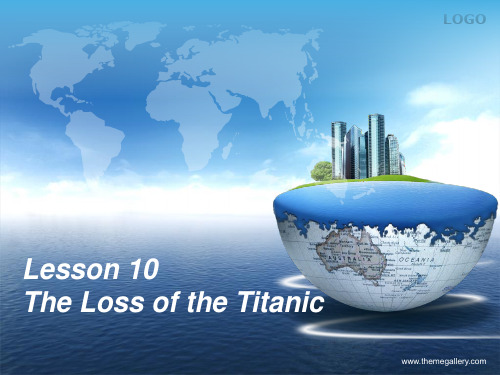
★slight ★tremble ★faint ★horror ★abandon ★plunge ★lifeboat
[slaɪt] adj.轻微的 [ˈtrembl] v.震颤 [feɪnt] adj.微弱的 [ˈhɒrə(r)] n.恐惧 [əˈbændən]v.抛弃 [plʌndʒ] v.投入,跳入 [ˈlaɪfbəʊt] n.救生船
['ɪnər] n.班船 [ˈvɔɪɪdʒ] n.航行(海上航行) ★Iceberg [ˈaɪsbɜ:g] n.冰山 ★lookout [ˈlʊkaʊt] n.瞭望员 ★collision [kəˈlɪʒn] n.碰撞 ★Narrowly [ˈnærəʊli] adv.刚刚,勉强地 ★miss [mɪs] v.避开 ★iner ★voyage
Text
2、She was carrying 1,316 passengers and a crew of 891. She was carrying... (carry 表示载有) a crew of 一组人员
Text
3、Even by modern standards, the 46,000 ton Titanic was a colossal ship. modern standards 现代的标准 by = according to 表示依据 by regulation 依据规则(regulation n.规则, 规 章) by rules 依据条例(rule n.规则, 惯例) by our estimate 依据我们的估计(estimate n. 估计, 估价, 评估 v.估计, 估价, 评估) by one's looks = by one's appearance 根据某 人的长相(appearance n.外貌, 出现)
Lesson 10 The Trial That Rocked__ the World 高级英语第一册课件

Background Material
3. Main characters in the trial 1) John Scopes 2) The defendant counsels (counsels for the defense):
Clarence Darrow; Dudley Field Malone 3) The prosecutor counsel (counsel for the prosecution)
Origin oll organisms, including ourselves, are the products of a slow, natural process of development —"evolution’’.
Social Background of Darwins
Queen Victoria came to the throne in 1837, when she was 18 years old. She ruled for 63 years until 1901, longer than any other British King or queen had ever ruled. This period came to be known as the Victorian Age. During this period, great economic, social, and political changes took place and Great Britain became the strongest and richest country in the world. The British Empire, which included Canada, Australia, India, New Zealand, and large parts of Africa, had about a quarter of the world’s land and about a quarter of the world’s people. Wealth poured into Britain from its colonies. Industry and trade expanded rapidly, and the country became known as the workshop of the world, by the end of the age, Britain was becoming more the banker of the world. Science and technology made great advances. People were better educated. The middle class grew enormously. Literature flourished. In addition, the government introduced democratic reforms.
高级英语(第三版)第二册第十课 The discovery of what it means to be an American[精]
![高级英语(第三版)第二册第十课 The discovery of what it means to be an American[精]](https://img.taocdn.com/s3/m/2dd7651331b765ce04081435.png)
Albert Camus (1913-1960)
French novelist, essayist and playwright, who received the 1957 Nobel Prize for literature. Camus was closely linked to his fellow existentialist Jean-Paul Sartre in the 1940s, but he broke with him over Sartre's support to Stalinist politics. Camus died at the age of forty-six in a car accident in France. Among his best-known novels are The Stranger (1942) and The Plague (1947).
General Understanding of the Text
1. Type of literature:
a piece of expository writing
• Some methods of developing ideas in :
•
a point by point analogy
Anna Karenina
A novel by the Russian author Leo Tolstoy. It is considered to be one of the master-
pieces of the world literature. It was first published from 1875 to 1877 as a serial in the Russki Vestnik (Russian Messenger). The first complete English translation appeared in 1899.
研究生英语阅读教程基础级(第三版)教学课件Lesson 10
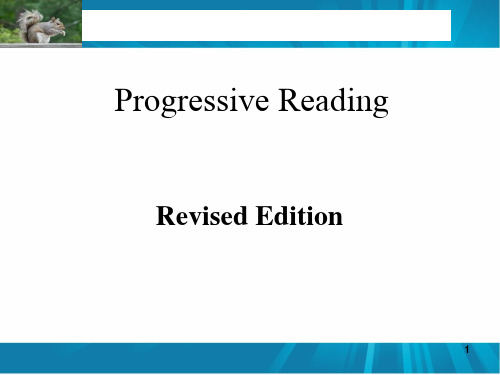
Stage name: John Wayne
He was an American film actor, director and producer. He epitomized (象征) rugged(粗犷的) mascu-
Progressive Reading
Revised Edition
1
策 划: 主 编: 副主编: 制作人:
2
Lesson Ten
Mrs. Squirrel and I Negotiated Terms
3
Catalogue Background Information Warm-up Questions Main Idea Language Points Difficult Sentences Keys to the Exercises
4
Background Information
Margot Devlin Now a government officer of Ontario, Toronto, On--Business Contact Information in Jigsaws business directory.
5
BackgTrroaunnsdlaItniofonrmation
13
Porch
A covered shelter projecting(突出)in front of the entrance of a building
14
Catnip
Plant of the mint family(唇形科), with downy(长着 绒毛的)leaves, purple-spotted white flowers, and a pungent(ts. Also called catmint(樟脑草).
新概念二lesson10教案

20mins
一般过去时中的被动语态的构成以及过去分词的变化规则
Text analysis
25 min
is called a clavichord.
call在这里的意思是“把……称为”、“称呼”,既可用于主动态,也可用于被动语态。
call ./ called称某人为……,什么被称为……
Homework assignment
5mins
Review words
Review text
Finish the activity book
Listening & understanding:What happened to the clavichord
Text:P48
New words andexpressions: jazz,musical,instrument,clavichord,recently,damage,key,string,
What do you call this你们把这称为什么
has belonged to our family for a long time.
belong是一个表示状态的动词,而不是行为动词,所以不能用于进行时,常用的时态是一般现在时和现在过去时。
tried to play jazz on it!
shock,allow,touch(词汇扩展见课课练)
Notes: It is called a clavichord./was bought..., a friend of my father’s.
Translation:P48
Summary writing: P48-49
Key structures:一般过去时中的被动语态
- 1、下载文档前请自行甄别文档内容的完整性,平台不提供额外的编辑、内容补充、找答案等附加服务。
- 2、"仅部分预览"的文档,不可在线预览部分如存在完整性等问题,可反馈申请退款(可完整预览的文档不适用该条件!)。
- 3、如文档侵犯您的权益,请联系客服反馈,我们会尽快为您处理(人工客服工作时间:9:00-18:30)。
To be continued on the next page.
Lesson 10 – Diogenes and Alexander
II.
Diogenes
comparison: DIOGENES AND ALEXANDER
Find out the similarities and differences.
W B T L E
To be continued on the next page.
Lesson 10 – Diogenes and Alexander
II.
Diogenes
How did he become a Cynic philosopher?
Cynic Diogenes: Diogenes became a disciple of Antisthenes, who was at the head of the Cynics. Antisthenes at first refused to admit him and even struck Diogenes with a stick. Diogenes calmly said, "Strike me all you want but I will not leave your presence, while you speak anything worth hearing." Antisthenes was so impressed with this reply that he admitted him into the Cynics. Diogenes fully adopted the principles and character of his master.
During his lifetime, Diogenes encountered the most powerful of individuals and treated them with scorn. They in turn responded with admiration. When Alexander announced: "I am Alexander, the great king." Diogenes replied: "I am Diogenes the dog", using his nickname to show his contempt for the titles others valued. Alexander is quoted as saying that had he not been Alexander, he would have liked to have been Diogenes.
W
B
T
L
E
To be continued on the next page.
Lesson 10 – Diogenes and Alexander
II.
Diogenes
Diogenes deemed man the most intelligent and the most foolish of the animals. Most needed the halter. He is said to have wandered through the market place bearing a lamp in broad daylight proclaiming: "I am looking for a man." Slavery was a matter of attitude. Diogenes himself had once been captured and sold as a slave. When asked by the slave master what he could do, he replied: "Govern men", and asked for a buyer who wanted a master. The purchaser made him tutor to his sons who did indeed obey and revere him.
W B T L E
The end of Diogenes.
Lesson 10 – Diogenes and Alexander
III. Cynicism
Cynicism: A philosophy, first expounded by Diogenes, that encourages indifference to social convention and material comforts in order to concentrate on self-knowledge. The aim of the Cynic was to become self-determining, hence free, by living in accordance with nature.
Lesson 10 – Diogenes and Alexander
Part Two
W
B
T
L
E
ENTER
Preview questions
1. What do you know about the historical background of the people discussed in the essay? 2. What does the essay tell us about Diogenes and Alexander? 3. What is a possible reason for an author to write the essay? 4. How is the essay structured?
W
B
T
L
W
B
T
L
E
The end of Author.
Lesson 10 – Diogenes and Alexander
II.
Diogenes
Diogenes : (412 B.C. — 324 B.C.), Greek philosopher who founded the Cynic school of philosophy, stressing self-control and the pursuit of virtue. He was the son of Hicesias, who was exiled from his home town, allegedly for defacing( 损坏 ) the currency. Thereafter, he lived in streets of Corinth and Athens where he is said to have lived in a barrel. He became the prototype of Cynicism.
W B T L E
To be continued on the next page.
Lesson 10 – Diogenes and Alexander
III. Cynicism
From a popular conception of the intellectual characteristics of the school comes the modern sense of “ cynic ” , implying a sneering disposition, a disbelief in the goodness of human motives and a contemptuous feeling of superiority.
W B T L E
Lesson 10 – Diogenes and Alexander
I.
Author
Gilbert Highet (1906—1978) was US “educator, author, and critic”. “He is noted for popularizing intellectual topics.”
Cynicism emphasized moral self-mastery, rejection of government, property, marriage and religion.
The Cynics agreed in taking a dog as their common badge or symbol.
W
B
T
L
E
The end of Alexander the Great.
Hale Waihona Puke WBTL
E
Lesson 10 – Diogenes and Alexander
V.
Plato & Aristotle
Plato (427?—347 BC?) was a Greek philosopher, a follower of Socrates. He founded the Academy (386), where he taught and wrote for much of the rest of his life. Plato presented his ideas in the form of dramatic dialogues, as in The Republic.
W B T L E
Lesson 10 – Diogenes and Alexander
Background information
I. Author
II.Diogenes III.Cynicism IV.Alexander the Great
